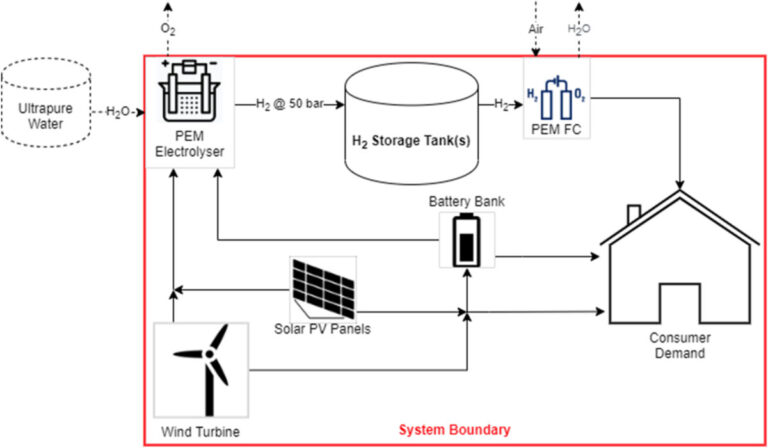The proposed system, devised by a Dutch research group, aims to store excess renewable electricity through hydrogen generation and battery storage, with the latter only used when hydrogen generation is not immediately available. Despite the high initial cost, the system can reportedly provide stable operation.
Researchers from Hanze University of Applied Sciences Groningen in the Netherlands have investigated for the first time how hydrogen production and battery storage can be combined with PV energy on roofs or small wind turbines in off-grid households.
“To our knowledge, no published study has used the hydrogen system as the primary store when hybridizing renewable energies with batteries and, importantly, no study has taken into account the variable start-up requirements for hydrogen proton exchange membrane (PEM) electrolyzers . production and storage when designing off-grid renewable energy systems,” the group said, adding that the batteries are intended to be used to avoid curtailment when hydrogen production cannot be prioritized.
The scientists explained that hydrogen systems based on PEM electrolysis offer the advantage of being fast-response, suitable for storage systems where the hydrogen system acts as the main storage unit, coupled with a battery as secondary storage. However, they also emphasized that the hydrogen generated via electrolysis must be dried and purified from traces of water and oxygen before it can be used.
The proposed system is intended for the storage of excess solar energy, with the battery acting as a primary storage unit only when hydrogen generation is not immediately available. It consists of a 4.5 kW PEM hydrogen electrolysis system, a 0.85 m3 hydrogen storage tank, a 0.8 kW purification unit, a PEM hydrogen fuel cell and a lithium-ion battery. “The fuel cell can only supply power directly to the consumer and does not charge the battery or support the electrolyzer,” the academics explained. “The electrolyzer and the fuel cell require demineralized water and air respectively to operate.”
The system also uses a pressure control valve to adjust the hydrogen output pressure, which can be set to almost 50 bar without external means. It is also able to keep the electrolyzer running when the excess solar energy is close enough to the minimum power of the electrolyzer and the expected excess power in the next 10 minutes is relatively high. “It uses the battery to store energy when the power or duration of electricity from renewable energy sources is insufficient to start and operate the electrolysis system,” the scientists said.
The research group simulated the system’s performance through Python software and used multiple inputs to decide how to store electrical energy if there was a surplus. They assumed that the system would be deployed in a typical detached Dutch house with an annual demand of 4 MWh.
The simulation showed that the best system configuration for the PV source includes a 2.65 kW solar panel with a tilt angle of 35 degrees and an azimuth angle of 180 degrees. The cost of the PV system was estimated at €1,317 ($1,430)/kW, while that of the electrolyzer and fuel cell was estimated at €9,677 and €7,500 respectively. The cost of the hydrogen tank was stated at €1,915 and that of the 2.93 kW battery was estimated at €372.5/kWh.
The analysis showed that the electrolyser could not operate at its maximum rated power under any circumstances, which means it can be downsized, reducing the cost of the system, the researchers underlined. “Sensitivity analysis of varying the rated power of the electrolyzer showed that an electrolyzer with a rated power between 1,550 W and 2,000 W is more adequate and cost-effective for the base case configuration defined in this study,” they further explained. adding that the optimal battery capacity was set at around 3 kW.
The simulation series also showed that using wind energy alone was more cost-effective than using solar energy alone, while a combination of the two sources produced the best results. “The energy required by the purification unit can be considered negligible for all scenarios,” the academics added, noting that future research should test the proposed solution on a larger scale or in a system that integrates heat production.
The system was introduced in the study “Simulation and analysis of hybrid hydrogen-battery sustainable energy storage for an off-electric-grid Dutch household system”, published in the International Journal of Hydrogen Energy.
This content is copyrighted and may not be reused. If you would like to collaborate with us and reuse some of our content, please contact: editors@pv-magazine.com.


